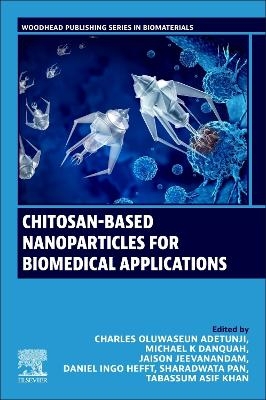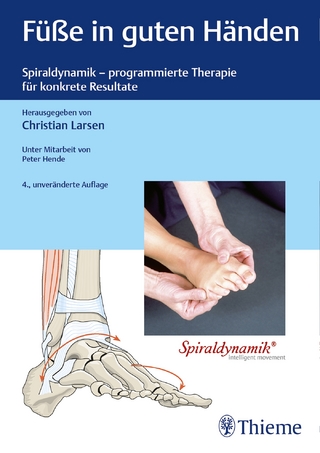
Chitosan-Based Nanoparticles for Biomedical Applications
Woodhead Publishing (Verlag)
978-0-443-13997-0 (ISBN)
Prof. Charles Oluwaseun Adetunji is a full Professor at the Department of Microbiology, Faculty of Sciences and the Director of Research and Innovation, Edo State University Uzairue (EDSU), Edo State, Nigeria. He formerly served as the Acting Director of Intellectual Property and Technology Transfer, Head of the Department of Microbiology, and Sub Dean of the Faculty of Science. Currently, he holds the positions of Chairman of the Grant Committee and Dean of the Faculty of Science at EDSU. Prof. Adetunji is a Fellow of the Royal Society of Biology in the UK. Additionally, he serves as a Visiting Professor and the Executive Director of the Center for Biotechnology at Precious Cornerstone University, Nigeria. His research centers on applying biological techniques and microbial bioprocesses to achieve Sustainable Development Goals (SDGs) and contribute to advancements in agriculture. Dr. Danquah is a full Professor and the Director of Chemical Engineering Program at the University of Tennessee, Chattanooga, United States. He is a Chartered Engineer (CEng), Chartered Professional Engineer (CPEng), Chartered Scientist (CSci) and a Fellow of the Institution of Chemical Engineers (IChemE). Dr. Danquah’s research focuses on the utilization of bioprocess and biomolecular engineering principles to develop emerging biopharmaceuticals, biosensing and molecular separation systems; environmental bioremediation systems; and biofuels and bio-products. Dr. Danquah’s research findings are well published and cited with over 230 peer-reviewed journal articles, book chapters, conference publications and technical reports. His research has also resulted in intellectual properties and patent applications, large-scale manufacturing plants, and commercialized products and formulations. Dr. Jaison Jeevanandam obtained his Ph.D. in the Department of Chemical Engineering, Faculty of Engineering and Science from Curtin University, Malaysia. His Ph.D. project focused on the development of a novel nanomedicine for reversing insulin resistance in Type 2 diabetes. He has experience in nanoparticle synthesis, especially in green synthesis using plant extracts, characterization, cytotoxic analysis of nanoparticles, and in vitro analysis in diabetic models. His current research focuses on the application of bionanotechnology in the development of nanoformulations for drug delivery. Dr. Jaison has authored an edited book on ‘Research advances in dynamic light scattering’ for Nova Science Publishers, United States and contributed about 16 book chapters and 28 journal articles along with some conference papers. Daniel Hefft is a food engineer from Germany. He is the team lead of the Product Research and Ingredients Team within the Consulting Technologies group at Campden BRI. He is also an Honorary Research Fellow of Chemical Engineering in the School of Chemical Engineering of the University of Birmingham. Prior to this appointment, Daniel lectured in Food Sciences, Dairy Technology/ Engineering, and Precision Agriculture at University Centre Reaseheath and served as the Academic Director of the Institute of Sustainability and Food Innovation. He got his undergraduate degree and food engineering qualification from Technische Hochschule Ostwestfalen-Lippe with specialisation in cereal technology. He has a MSc degree from the University of Reading and PhD in Chemical Engineering from the University Birmingham. He has been awarded Research Fellowships (2019) and a Research Affiliation in Nanoengineering (2020-2021) with the University of Birmingham. Further he has extensive years of experience in the food industry, having worked for a range of leading companies. His speciality are food process design and engineering. He was the founder and past CTO of Rheality Ltd (2020-2021), which utilises a novel and patented technology based on acoustic sensing and machine learning for live and in situ rheology measurements. He is also co-inventor of a new packaging system that extends shelf-life of fresh produce without the need of active cooling. Daniel is also the founder of the Engineering for Food and Drinks Special Interest group at the Institution of Agricultural Engineers and its current chair. Since 2018 he gained professional recognition as a Chartered Engineer with the Institution of Agricultural Engineers. He is further involved in the Association of German Food Technologists (GDL e.V.), a lifetime member of the Society of Dairy Technology, the International Society of Food Engineering, and the Institute of Physics (IOP). He is a Chartered Scientist with the IOP since 2021. His academic contributions include 60+ scientific publications in internationally recognised, high impact factor, peer-reviewed journals, and books. He has been awarded with the Distinguished Scientist award in Chemical Engineering by PCU in 2020. Further, there are two patents to his name relating to the invention of an in-line rheometry device and a novel composite packaging for primary and secondary application. Dr. Sharadwata Pan obtained his tertiary education (Bachelors and Masters in Technology, 2002-2007) in Biotechnology in India. Following this, he obtained his PhD degree in 2015, working in an interdisciplinary area transcending molecular biotechnology and polymer physics, via a unique, dual-badged programme between Indian Institute of Technology Bombay, India and Monash University, Australia. Since 2016, he is working in Germany, first as a scientific staff at the Technical University of Munich (2016-2023), and currently (2023-to date), in the same capacity at the Friedrich-Alexander University of Erlangen-Nuremberg. For the past 6 years or so, his main expertise encompass developing the next generation of patentable healthcare, cosmetics and biomedical products, partnering with German SMEs and raising third party research grants (> 1M €) to carry out cutting edge and application oriented research, primarily targeted towards industrial product development. His main focus lies on generating sustainable solutions and specializes in benchmarking existing commercial products and conceptualization of innovative techniques to tune novel prototypes. Dr. Tabassum Khan is currently full professor and Head of depatment in Department of Pharmaceutical Chemistry & Quality Assurance, SVKM’s Dr. Bhanuben Nanavati College of Pharmacy, Mumbai, India. Her research focuses on pharmaceutical chemistry for the synthesis of innovative drugs, biomaterials and nanoparticles for cancer and other specific disease treatment. She has been awarded with SHASTRI fellow – SMP by Ministry of Human Resource and Development, Government of India in 2017-2018. She has procured about 24.6 million Indian rupees as research grant from various national and international funding agency. Further, she has been a reviewer for research projects and centers in various countries, such as Poland, Serbia, Canada, and South Africa. She has published about 54 peer-reviewed journal articles, 6 book chapters, 1 patent and filed 4 patent applications.
1. Extraction, properties, and modification of chitosan-based nanoparticles
2. Bioinformatics, instrumentation, and control for modeling, synthesis, and characterization of chitosan based nanoparticles
3. Biosynthesized and natural chitosan-based nanoparticles for biomedical applications
4. Chitosan-based nanoformulation of phytochemicals for biomedical applications
5. Chitosan-based nanoformulation of metal and metal oxide nanoparticles
6. Application of chitosan-based nanoparticles in the treatment of cancer
7. Chitosan-based nanoparticles for insulin delivery and diabetes treatment
8. Enhanced chitosan-based nanoformulation for antifungal applications
9. Application of chitosan-based nanoparticles as an effective antibacterial agent
10. Chitosan-based nanoparticles to treat highly resistant microorganisms and pathogenic parasites
11. Healthcare application of chitosan-based nanoparticles incorporated with antimicrobial textile
12. Application of chitosan-based nanoparticles for the treatment of kidney diseases
13. Application of chitosan-based nanoparticles for the treatment of liver diseases
14. Chitosan-based nanoparticles for the treatment of neurological disorders
15. Chitosan based nanoparticles for the treatment of rare genetic diseases
16. Chitosan-based nanoformulations for alopecia treatment
17. Chitosan-based nanoformulation as nebulizer for nasal drug delivery in cystic fibrosis treatment
18. Chitosan-based nanoparticles as an antihypercholesterol agent
19. Chitosan based nanocarriers for delivery of therapeutic agents
20. Chitosan-based nanoparticles as an effective hormone delivery agent
21. Chitosan-based nanoparticles for tissue engineering and wound healing application
22. Nutraceutical applications of chitosan-based nanoparticles
23. Machine learning models in clinical trials of chitosan-based nanoparticles potency
24. Toxicology of nanoengineered chitosan
25. Chitosan-based nanoparticles in the management of cardiovascular disease
26. Chitin and chitosan: evolving application landscape in tissue engineering, wound healing, and drug delivery
27. Recent advances in the application of next-generation chitosan-based nanoparticles applied in the management of numerous kidney diseases and its complications
28. Current trends in the utilization of next-generation chitosan-based for sustainable treatment of liver diseases
29. Recent applications of chitosan-based nanoformulated metal and metal oxide nanoparticles
30. Application of nanochitosan for detection and diagnosis of diseases
| Erscheinungsdatum | 16.11.2024 |
|---|---|
| Reihe/Serie | Woodhead Publishing Series in Biomaterials |
| Sprache | englisch |
| Maße | 152 x 229 mm |
| Gewicht | 1000 g |
| Themenwelt | Medizin / Pharmazie ► Physiotherapie / Ergotherapie ► Orthopädie |
| Technik ► Elektrotechnik / Energietechnik | |
| Technik ► Maschinenbau | |
| Technik ► Medizintechnik | |
| Technik ► Umwelttechnik / Biotechnologie | |
| ISBN-10 | 0-443-13997-0 / 0443139970 |
| ISBN-13 | 978-0-443-13997-0 / 9780443139970 |
| Zustand | Neuware |
| Informationen gemäß Produktsicherheitsverordnung (GPSR) | |
| Haben Sie eine Frage zum Produkt? |
aus dem Bereich


